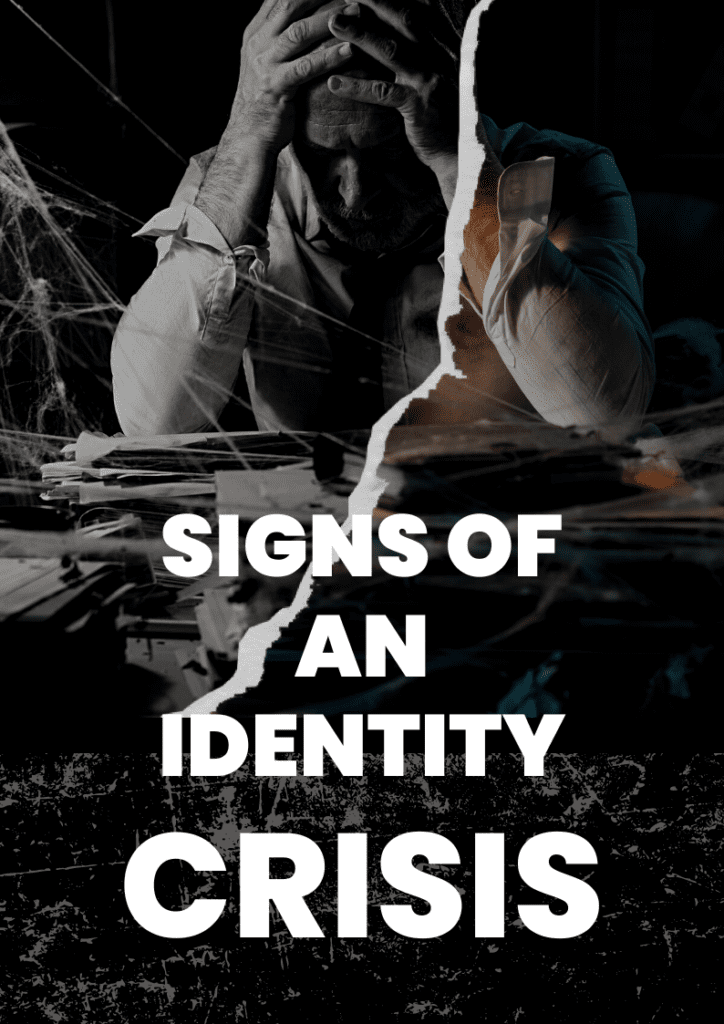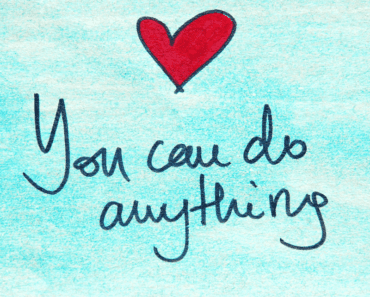Last Updated on February 29, 2024 by Christin
An identity crisis is part of life that causes a lot of confusion, insecurity and uncertainty. It is a period where an individual struggles to figure out who they truly are and what they want in life. This can happen at any stage of life and can be triggered by various factors such as major life changes, societal pressures, or personal experiences.
What Exactly Is An Identify Crisis?
An identity crisis might sound like a dramatic term, and in some ways it is, given the intense feelings it can provoke. But put simply, it’s when you’re asking yourself the big questions: “Who am I?” “What’s my purpose?” or “Where do I belong in the world?”
It’s a time of deep reflection and sometimes confusion as you try to align your actions, beliefs, and life direction with your sense of self.
This phase of questioning and self-doubt isn’t just for teenagers going through puberty; adults can experience it too, maybe during major life milestones or transitions.
You might also hear it referred to as a “personal crisis” or “identity struggle,” but no matter the name, it’s a natural part of discovering and defining who we are.
1. You Suddenly Feeling Lost and Confused
Feeling lost and confused is often the first and most palpable sign of an identity crisis. This sensation can sweep over you like a fog, making once-clear paths and decisions seem obscure and daunting.
It’s akin to standing at a crossroads without any signposts, uncertain which direction leads to your true self.
This confusion arises because your internal compass—the set of values, goals, and self-perceptions that guide you—is in flux. You may start to question career choices that once seemed perfect fits or relationships that were once sources of joy.
Hidden signs that you might be navigating this maze of confusion include restlessness, a pervasive sense of dissatisfaction, or an inexplicable feeling of being out of place, even in familiar settings.
You might also find yourself envious of others who appear more ‘anchored’ in their identities, or constantly comparing your life to an imagined ideal.
These symptoms, while subtle, underscore the internal disarray you’re experiencing. Compounding the issue is the fact that these feelings are often dismissed by others as mere indecisiveness or a phase, undermining the profound existential questioning at play.
2. You Don’t Recognize Yourself In The Mirror Anymore
When you look in the mirror and no longer recognize the person staring back at you, it can feel alarming—even a little surreal. This isn’t about physical changes, though those might also play a part; it’s deeper than that.
Imagine getting ready for the day, catching your reflection, and pausing because, somehow, the inner essence of who you are doesn’t match the exterior. It’s as if there’s a stranger in your skin. This discordance can manifest subtly at first. Maybe you realize the clothes you used to love now feel like costumes, or the expressions that cross your face in reaction to daily events don’t quite make sense to you anymore.
This sense of alienation from your own reflection is telling; it’s a visual and visceral sign that the identity you’ve built or accepted over the years might not align with your true self.
It’s a hint that the interests, passions, and even the personality traits you’ve embraced might not be as authentic to you as you once believed.
Hidden signs include a reluctance to engage in self-reflection (literally avoiding mirrors), feeling disconnected during social interactions as if you’re playing a role rather than being yourself, and a general sense of unease or artificiality in your day-to-day life.
Recognizing this incongruence is a vital step towards understanding that you may be undergoing an identity crisis, setting the stage for exploration and, eventually, revelation of your authentic self.
3. Persistent Feelings of Restlessness
Persistent feelings of restlessness can be a profound indicator that you are experiencing an identity crisis. This restlessness isn’t just about feeling bored or needing a change of scenery; it’s a deeper, more persistent itch that something fundamental in your life doesn’t align with your true self.
You might find yourself changing hobbies, jobs, or even relationships frequently, trying to shake off a discomfort that never fully recedes.
For example, you could be excelling in your career, yet feel an inexplicable urge to abandon it all for something entirely different, not out of passion but out of a need to escape a discomfort you can’t quite articulate.
Hidden signs of this restlessness include a lack of satisfaction from achievements that once would have made you proud, feeling inexplicably trapped even when there are no visible constraints, and a consistent interest in drastic changes.
You might also notice a pattern of indecision, constantly questioning your choices, or fantasizing about a life drastically different from your own – a life where you feel a sense of belonging and purpose.
This restlessness is a signal from your deeper self that the identity you’re presenting to the world doesn’t match up with who you truly are. It’s a call to action, urging you to explore and realign with your authentic self.
4. Questioning Your Core Beliefs
Questioning your core beliefs is another significant marker of an identity crisis. This questioning isn’t about healthy skepticism or the natural evolution of beliefs over time; it’s a profound, often unsettling reevaluation of the fundamental principles that have guided your life until now.
You may begin to doubt beliefs that have been cornerstones of your identity, like your spiritual convictions, political affiliations, or definitions of success and happiness.
For example, someone who has always identified as highly ambitious might suddenly find themselves questioning the value of their career-driven lifestyle, pondering if personal fulfillment might lie elsewhere.
Hidden signs of this deep-seated questioning include feeling alienated from communities or groups you once felt part of, an inexplicable sense of emptiness even when conforming to previously held beliefs, and a pervasive feeling of being lost or disconnected from yourself.
You might also experience intense internal conflict when trying to align your actions with beliefs that no longer feel true, leading to anxiety or a sense of being a fraud.
This stage of questioning is daunting but essential; it’s your psyche’s way of encouraging you to peel back layers of assumed identity to reveal what truly resonates with your authentic self.
5. Seeking Out New Experiences
A critical facet of navigating through an identity crisis involves the pursuit of new experiences. This search is not merely about breaking monotony or the thrill of novelty; it’s a deeper, more subconscious attempt to discover facets of yourself that were previously unexplored or suppressed.
People might find themselves drawn to activities, hobbies, or social circles vastly different from their usual preferences.
For instance, someone who has spent years in a rigid, corporate environment might suddenly develop an interest in creative arts, travel, or outdoor adventures, seeking a sense of freedom and self-expression that their former life lacked.
Hidden signs of this quest for new experiences can include a sudden aversion to routine, making impulsive decisions, or a persistent feeling that something fundamental is missing from your life.
This phase can also be marked by an intense desire to “break free” from perceived constraints or to challenge societal norms and expectations that you previously adhered to without question.
While this exploration can be liberating, it may also lead to feelings of guilt, confusion, or isolation, especially when these new pursuits diverge significantly from the expectations of your family, friends, or culture. However, this exploratory phase is essential for identity reconstruction, serving as a bridge between who you were and who you’re becoming.
6. Reevaluating Your Relationships
During an identity crisis, reevaluating your relationships often serves as a crucial, though subtle, sign that profound changes are taking place within your psyche.
This period of introspection can lead to questioning the depth, authenticity, and value of your connections with friends, family, and romantic partners.
You might find yourself pondering if these relationships reflect your true self or if they’re remnants of a persona you’re striving to outgrow.
For example, friendships based on past hobbies or interests might suddenly seem unfulfilling or superficial, prompting a desire for more meaningful connections that resonate with your evolving identity.
Hidden signs of this reevaluation can include withdrawing from social circles, feeling disconnected during conversations about topics that once interested you, or even experiencing irritation with people who seem static or unchanging.
This can be misinterpreted by others as moodiness or dissatisfaction with life in general, but it’s more accurately a reflection of your internal transformation.
Such a phase might lead to periods of loneliness or isolation as you distance yourself from relationships that no longer align with your emerging sense of self. Nonetheless, this process is essential for forming new relationships that are in harmony with the person you are becoming, marking a pivotal step in navigating through an identity crisis.
7. Trying To Find Meaning and Purpose
While going through an identity crisis, it’s common to question your purpose and meaning in life. You might feel lost or unsure of what direction to take, causing feelings of anxiety and confusion. This is a natural part of the self-discovery process as you reevaluate your values, goals, and passions.
Among the hidden signs that someone is searching for meaning and purpose include an increased interest in self-help books, podcasts, and seminars focusing on personal growth and development.
There might also be a noticeable shift towards activities that are perceived as more meaningful or fulfilling, such as volunteering, creative arts, or spending time in nature. This quest often leads to introspective practices like journaling or meditation as tools for self-exploration and clarity.
Additionally, there could be a change in conversations, with topics veering more towards existential questions and discussions about life’s bigger picture rather than mundane or superficial subjects.
How To Work Through An Identity Crisis
Working through an identity crisis involves introspection, patience, and the willingness to explore and accept various aspects of yourself.
Start by acknowledging your feelings without judgment, understanding that it’s a natural process of growth and self-discovery.
Engage in activities that resonate with your current interests and values to gain insights into what truly fulfills you. This could mean dedicating time to creative pursuits, volunteering, or spending moments in nature, which not only brings peace but can also illuminate your purpose and passions.
Equally important is seeking support. Talk to trusted friends or family members about your thoughts and feelings, or consider professional help from a therapist, who can guide you through this transitional period with a structured approach.
Additionally, engaging in self-help resources, such as books, podcasts, and seminars, can provide valuable perspectives and coping strategies.
Most importantly, give yourself grace and time to unfold this new chapter of your life, understanding that it’s okay to evolve and change directions as you grow.
How To Help Someone Else Going Through An Identity Crisis
Helping someone who is navigating through an identity crisis requires a delicate balance of supportiveness and self-preservation.
Begin by offering a listening ear, allowing them to express their thoughts and feelings without interjecting your opinions or solutions unless they are solicited.
It’s imperative to show empathy and validate their experiences while avoiding the urge to minimize their feelings. Encouraging them to seek professional help or explore self-help resources can also be beneficial.
However, it’s crucial to establish boundaries to protect your own emotional well-being. This may involve setting limits on the amount of time you spend discussing their crisis, or gently redirecting conversations to lighter topics when necessary.
Remember, it’s okay to take breaks and engage in self-care practices that rejuvenate you.
Maintaining your own happiness and personal well-being is not selfish but necessary for you to be able to support others effectively.
Will Everyone Go Through An Identity Crisis?
While it’s common, not everyone will experience an identity crisis in the traditional sense. Life’s trajectory is diverse, and individuals respond differently to change and challenges.
For some, self-identity evolves quietly and consistently over time without dramatic questioning or reevaluation. Factors such as a stable upbringing, a strong sense of self from an early age, or less exposure to significant life changes can contribute to this steady development.
It’s important to recognize that whether or not someone undergoes an identity crisis does not determine the depth of their personal growth or self-awareness. Each person’s journey is unique, and there are multiple paths to understanding and defining one’s identity.






